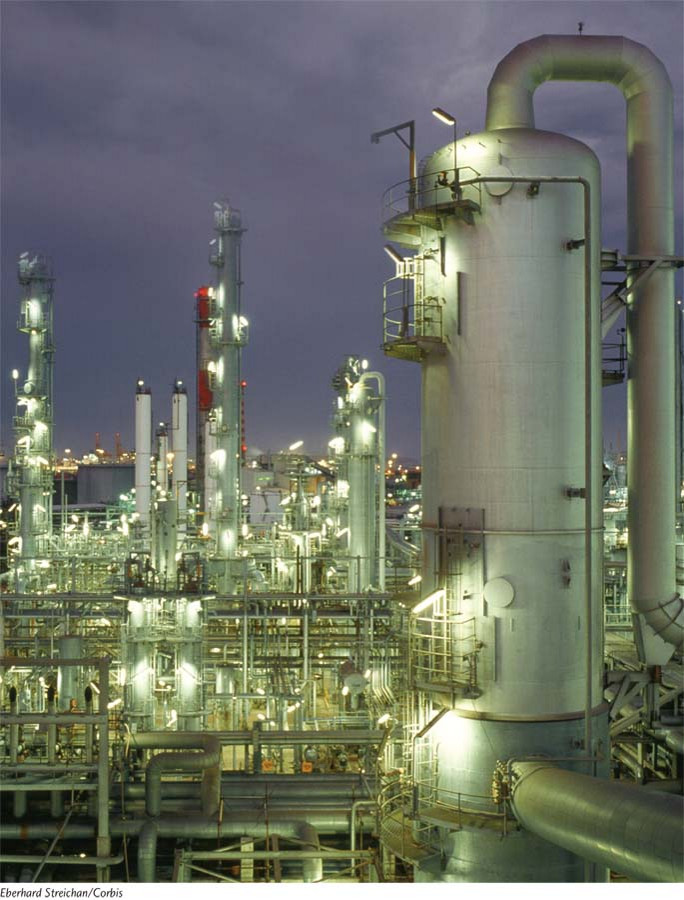Chapter Introduction
chapter 12
Nonrenewable Energy Resources

All Energy Use Has Consequences
The modern world is dependent on fossil and nuclear fuels for energy. Many of the benefits of our modern society—
The modern world is dependent on fossil and nuclear fuels for energy but the costs to society are high.
For example, on April 20, 2010, an explosion and fire occurred at the British Petroleum Deepwater Horizon oil rig in the Gulf of Mexico. Oil gushed from the rig until it was capped 87 days later, on July 15. The BP accident killed 11 workers on the drilling platform, injured 17 others, and released more than 780 million liters (206 million gallons) of oil into the gulf. Scientists from the Center for Biological Diversity later estimated that at least 6,000 sea turtles, 26,000 marine mammals, and more than 82,000 birds were killed as a result of the spill. The oil spread through the Gulf of Mexico and washed up on the shores of Louisiana, Mississippi, Alabama, and Florida.
Before the Deepwater Horizon incident, the largest spill in U.S. waters had been the March 1989 Exxon Valdez accident, when the Valdez, a supertanker carrying 200 million liters (53 million gallons) of oil, crashed into a reef in Prince William Sound, Alaska. Roughly 42 million liters (11 million gallons) of oil spilled into the sound, much of which washed up on shore, contaminating the coastline and killing perhaps half a million birds and thousands of marine mammals. The number of dead animals was so much greater in the Exxon Valdez accident because the spill occurred in a relatively enclosed sound rather than in open waters.
Oil spills remain an ongoing environmental problem in the modern world. Some spills are caused by leaks or explosions at wells, while others occur when oil is being transported by pipeline or tanker. Accidents can happen even after oil is extracted and transported to a refinery. In 2005, 15 workers died in an explosion at a British Petroleum oil refinery in Texas. And the hazards do not end with production. After the oil is refined into gasoline, jet fuel, or diesel fuel, it is used to run vehicles and heat buildings. This combustion process emits pollutants, which cause a number of environmental and human health problems.
Other fossil fuels pose similar risks. In the early 1900s, there were hundreds of accidental coal-
Natural gas is often considered to be “clean” because its combustion produces lower amounts of particulates, sulfur dioxide, and carbon dioxide than does oil or coal. However, combustion still results in emission of carbon dioxide, which is the major greenhouse gas produced by human activity. The production of natural gas also has negative consequences. “Thumper trucks,” which generate seismic vibrations to identify natural gas deposits underground, can disturb soil and alter groundwater flow, causing some areas to flood and some wells to go dry. Drilling for natural gas can also contaminate drinking water. Construction of natural gas pipelines is disruptive to the environment and is often opposed by those who live in the affected communities. And a growing number of studies suggest that an unknown but possibly substantial percentage of natural gas is lost during extraction and transport.
Nuclear energy is another nonrenewable energy resource. Unfortunately, it has contributed to a few energy catastrophes as well. Most recently, a 2011 earthquake off the coast of Japan resulted in a tsunami that damaged the nuclear reactors at the Fukushima nuclear power plant, leading to the release of radioactive gases. Even when operating properly, a nuclear power plant generates radioactive nuclear waste. Storage of this waste is currently an unresolved environmental challenge.
Sources: S. McGraw, The End of Country (Random House, 2011); L. Margonelli, Oil on the Brain (Broadway Books, 2008).
We use energy in all aspects of our daily lives: heating and cooling, cooking, lighting, communications, and travel. In these activities, humans convert energy resources such as natural gas and oil into useful forms of energy such as motion, heat, and electricity, with varying degrees of efficiency and environmental effects. Each energy choice we make has both positive and negative consequences. In a society like the United States, where each person averages 10,000 watts of energy use continuously—
In this chapter, we will look at the supplies of fossil fuel and nuclear fuel that we currently use. Chapter 13 addresses the renewable energy resources that we use to some extent now and that many people expect we will use even more in the future.